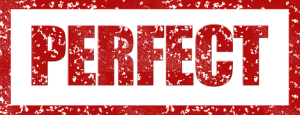The Perfect Resume
Between my “Worst Resume of the Week” series being published over the past couple months and my continuing work reviewing and rewriting resumes at Resume Raiders, I’ve been too focused on the negative lately. Let’s change that, if only for a day. I thought I’d take the opposite approach and provide a guideline for what I’d consider the perfect resume.
Top
Contact info – First and last name, bold and in a bit larger font than the rest of the resume. Address, phone, and email address in a smaller font to save space.
Links – Links to LinkedIn, GitHub/Bitbucket, Stack Overflow, and similar sites are often a nice touch. Even if you don’t have a ton of material on those sites, their presence helps create a three-dimensional person beyond just the resume. A link to a personal website or technical blog is also helpful if the content has some relevance or demonstrates a skill.
Summary – Two or three sentences that encapsulate you as a candidate. If we crossed paths at a conference and you had 15 seconds to explain why I should interview you, what would you say? Spare me the self-assessments about being a hard worker, team player, and having a great attitude. Everybody says those things. Instead, tell me what you do and how long you’ve done it, and areas of specialty or interest.
Let’s say you’re a full-stack web developer with seven years of Python experience primarily working in the healthcare space. Let’s also say that you are applying for my listed full-stack Python developer position at my healthcare startup; you could let the resume reader work his/her way through the resume, put together the clues, and eventually (hopefully) discover, “Hey, this candidate looks like a full-stack Python dev with healthcare experience!” Or you could just tell us that right away and eliminate the very realistic chance that the reader won’t pick that up.
Middle
Experience – Include job title, company, and dates. If you’re unemployed, don’t list the dates as ‘2010 – present’ and then play the “Oh, I didn’t update my resume yet with the end date” card. It comes across as deceptive. Update the resume before you send it out.
If it’s likely someone wouldn’t have heard of the company, a single line in small font to describe the employer can be helpful to provide context.
The experience details under each job could include a few sentences in paragraph form about your responsibilities, and then have unique and novel accomplishments listed below that in bullets. Quantifying things is usually helpful. How large was the team you lead? Do you have metrics on the performance improvements, lines of code, other factors?
Include at least the most relevant technolgies you used during the projects or overall job; languages, frameworks, and databases are usually enough here. It’s often redundant to list things like IDE’s or version control tools under experience, since we’ll list them as skills and hiring firms aren’t likely to require n years of experience with Eclipse and Git.
Bottom
Skills – This section is somewhat for the benefit of an automated scanning software (see ATS) and somewhat for the benefits of human reviewers who may be looking for certain skills required for the role. Separating skills into categories will make it easier for readers to find what they are seeking. Categories may include languages, frameworks, databases, operating systems, and usually some type of catch-all (tools or other). When it comes to communication and soft skills, show me, don’t tell me. “Hard worker” isn’t a skill.
Education/Certification – It should be clear how much education you have and whether or not you completed the program or earned the degree/certification. The name of the school and course of study should also be included. Unless you are a fresh grad, don’t waste space on specific classes towards a degree.
Other – Any other information that might indicate your experience and ability will usually be included at the end. This could include publications, users’ groups and Meetups, conferences, presentations, volunteering, community leadership, or a host of other things. Don’t include lists of references.
That’s it. Any questions?![]()
| Reference: | The Perfect Resume from our JCG partner Dave Fecak at the Job Tips For Geeks blog. |







Verry nice article, exactly what I needed.